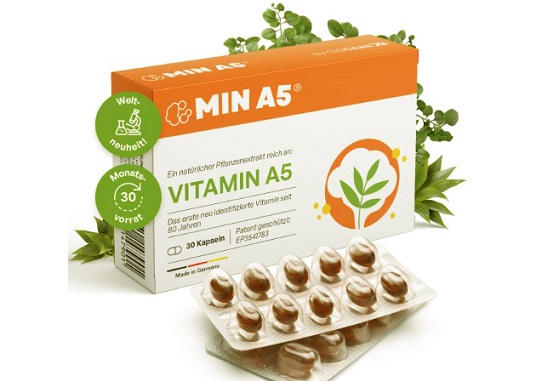Nikhil Prasad Fact checked by:Thailand Medical News Team Nov 24, 2024 4 months, 2 weeks, 6 days, 11 hours, 12 minutes ago
Medical News: A groundbreaking study has brought Vitamin A5 into the spotlight, a novel vitamin concept crucial for mental health and neurological function. Conducted by researchers from the Luxembourg Institute of Health (LIH), the Institute for Medical Research in Serbia, and CISCAREX UG in Germany, this study sheds light on Vitamin A5 intake levels in European countries and its significance in diet.
 Discovering Vitamin A5
Discovering Vitamin A5
The findings emphasize the pivotal role of Vitamin A5 in supporting brain and nerve health, with potential implications for preventing mental and neurological conditions.
What is Vitamin A5?
Vitamin A5, proposed as the first new vitamin category in 80 years, is a subcategory of Vitamin A, comprising compounds derived from dietary precursors such as 9-cis-beta-carotene (9CBC) from plant sources and 9-cis-13,14-dihydroretinol from animal products. These precursors convert to 9-cis-13,14-dihydroretinoic acid, an active molecule essential for retinoid X receptor (RXR) signaling. This
Medical News report highlights its critical functions, including dopamine regulation, brain clean-up, and cholesterol balance, which collectively maintain mental well-being and protect against conditions such as Alzheimer’s, schizophrenia, and multiple sclerosis.
Key Findings of the Study
The study analyzed the daily intake of Vitamin A5 across 27 European countries using dietary data from the EFSA and EPIC cohorts, encompassing over 65,000 individuals. Key highlights include:
-Vitamin A5 Levels in Foods
Fruits: Average 9CBC concentration of 0.2 µg/g.
Vegetables: Average 9CBC concentration of 5.2 µg/g, with leafy vegetables like spinach and parsley containing the highest levels.
-Intake Levels
Southern European countries, including Italy, Greece, and Spain, had the highest average Vitamin A5 intake due to higher consumption of leafy vegetables and fruits.
Central and Northern European countries, including Germany, Sweden, and the Netherlands, fell significantly below the recommended intake of 1.1 mg/day.
-Gaps in Nutrition
Approximately two-thirds of the European population consume less than the recommended 1.1 mg/day of Vitamin A5, with some countries averaging as low as 0.5 mg/day.
Fruits, despite being widely consumed, contribute minimally to Vitamin A5 intake due to their lower 9CBC content compared to vegetables.
The Implications of Insufficient Intake
A low intake of Vitamin A5 may compromise RXR-mediated signaling, linked to mental health stability and neurological health. The study posits that inadequate levels might correlate with the rising prevalence of mental health issues in countries with lower Vitamin A5 consumption. While Southern European nations report lower rates of these conditions, countries with poor intake lev
els show higher prevalence rates.
Recommendations for Improvement
The study strongly advocates for measures to enhance Vitamin A5 intake:
-Dietary Changes: Increasing consumption of leafy vegetables like spinach, kale, and parsley, which are rich sources of 9CBC.
-Food Fortification and Supplements: Introducing Vitamin A5 in fortified foods and dietary supplements to bridge nutritional gaps.
-Public Awareness: Governments and health organizations should actively promote dietary recommendations emphasizing Vitamin A5 intake.
Conclusion
The findings underscore the urgent need to address the widespread deficiency in Vitamin A5 intake across Europe. Given its critical role in mental and neurological health, enhancing dietary intake through natural sources or supplements is essential. Such measures could reduce the burden of mental health disorders and neurodegenerative diseases, especially in regions with predominantly Westernized dietary patterns.
The study findings were published in the peer-reviewed journal: Nutrients.
https://www.mdpi.com/2072-6643/16/23/4004
For the latest on Vitamin A5, keep on logging to Thailand
Medical News.
Read Also:
https://www.thailandmedical.news/news/fermented-bitter-leaf-as-a-game-changer-against-antibiotic-resistant-escherichia-coli-and-salmonella-typhi-bacteria
https://www.thailandmedical.news/news/the-antiviral-power-of-lemon-balm
https://www.thailandmedical.news/news/how-salidroside-helps-protect-the-brain-after-stroke
https://www.thailandmedical.news/articles/herbs-and-phytochemicals
